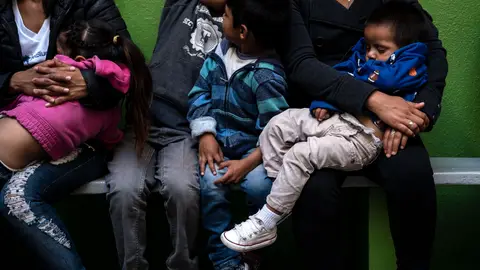The Trump Administration Is Making Conditions Even Worse For Migrant Children

By Lauren Rearick
More than 13,000 migrant children are being held at government-funded shelters throughout the United States, and based on a new decision from President Donald Trump, these kids could lose access to education, recreation, and legal services.
In a statement to the New York Times, the Department of Health and Human Services (HHS) confirmed on June 5 that the Office of Refugee Resettlement, which assists in housing and caring for unaccompanied migrant children, was to “begin scaling back or discounting” programs for children “that are not directly necessary for the protection of life and safety, including education services, legal fees, and recreation.” That includes English classes, and soccer games; the latter aren’t explicitly mandated by the 1997 decision made in Flores v. Reno that stipulates minimum standards for children held by governmental agencies, but they do count as recreation, and as a way to offer the children a brief reprieve from the overcrowding and inhumane conditions being forced upon them. Deeming such things “unnecessary” is abjectly cruel.
The cuts would impact children housed at more than 100 shelters throughout the United States, the New York Times reports. Under current immigration law, children that cross the United States border without a parent or guardian are sent to shelters until a case worker can reunite them with a relative or sponsor, the Washington Post reports.
Evelyn Stauffer, Health and Human Services spokesperson, attributed the cuts to a “humanitarian crisis at the border brought on by a broken immigration system that is putting tremendous strain (on the agency),” Time reports; the Trump administration is currently seeking $3 billion in funding from Congress to “increase shelter capacity,” NPR notes.
Many of the people attempting to cross the border are doing so in order to seek asylum, which is absolutely legal and must be done in the country or at the border; the Department of Homeland Security has recently begun detaining asylum-seekers after Attorney General William Barr ordered them to, as a means to discourage people from migrating altogether. Such tactics have not worked.
Critics of the cuts, including Congresswoman Rosa DeLauro, chair of the House Appropriations HHS subcommittee, pointed out that not providing children with these services could violate the Flores agreement. “Basic educational, recreational, and legal services for unaccompanied children are imperative for their physical and mental well-being,” she said in an interview with The Hill. “ORR’s cancelling of these services will inflict further harm on children... That is not only unacceptable, it could be in violation of the law."
Rochelle Garza, a staff attorney with the ACLU of Texas, told NPR that without recreation or education, children would be living in “prison-like conditions” and Amy Cohen, a psychiatrist who ensure Flores compliance at shelters told the New York Times that the move “violates every tenet of basic child welfare practice and will further harm the medical and psychological health of children fleeing extraordinarily dangerous circumstances in their home countries.”
Carlos Holguin, a lawyer who represented minors in Flores, promised to challenge the decision, telling the Washington Post, “We’ll see them in court if they go through with it. What’s next? Drinking water? Food? . . . Where are they going to stop?”
This is not the first time President Trump’s administration had faced criticism for its treatment of children at the border. Under his now-defunct “zero-tolerance” immigration policy, he and Attorney General Jeff Sessions decided to prosecute anyone who attempted to cross the United States border without prior documentation. Under the law, children were separated from their parents and placed in shelters. The move later made headlines as images from the shelters revealed that children were being kept in cages. More than 2,800 families were separated during that time, USA Today reports, and following increased pressure, Trump later rescinded the portion of his executive order that called for forced family separation. Some children are still separated from their families, the ACLU reported in October; others have been forced to wait for hours in vans before they were reunited with their families.





